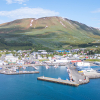These are examples of some of the many news headlines about the uneven distribution of vaccines during the pandemic.
This is also the focus of the research project "Strategic solidarity: Scandinavian countries' COVID-19 vaccine diplomacy" by researchers from the Danish Institute for International Studies (DIIS), the University of Oslo and Lund University.
How did the Scandinavian countries safeguard the lives and safety of their own populations while ensuring the equitable distribution of vaccines to the world's poorest? We met two of the researchers, Katerini Storeng and Antoine de Bengy Puyvallée, at the University of Oslo.
"None of the Nordic countries had the capacity to procure enough vaccines for themselves. Therefore, they had to rely on cross-border co-operation, which is what we call vaccine diplomacy. That is, politicians worked diplomatically to get vaccines for their own populations and to help other countries that also needed vaccines. In the project, we investigate the political processes behind the decisions of international solidarity on the one hand and national self-interest on the other," says Katerini Storeng.
Unequal distribution was called vaccine apartheid and vaccine nationalism
Scandinavia positioned itself as showing solidarity, but in practice, poor countries had to wait for vaccines until rich countries were supplied. The World Health Organisation (WHO) called it vaccine apartheid, and in the Nordics, people were offered the third dose when healthcare workers in low-income countries were offered the first dose. This was even though the richest countries in the world joined forces in the COVAX collaboration to ensure an equal distribution of vaccine doses to the entire world population.
"European countries helped push low-income countries down the list by competing for scarce vaccine doses. This happened at the same time as rich countries supported international co-operation through COVAX. But we became part of the European procurement mechanism, which competed against COVAX. It is not evident that Nordic politicians understood these tensions and contradictions. Politicians said that we are both helping our own population and the rest of the world, but both were in conflict with each other. So donating a lot of money didn't help when low-income countries had no access to the vaccines," says Antoine de Bengy Puyvallée.

Vaccine diplomacy - solidarity and self-interest
Norway, the only Scandinavian country outside the European Union, managed to secure a special agreement to purchase vaccines via Sweden. We cannot rely on this when the next pandemic hits, emphasises Katerini Storeng:
"We know that we will need more solid and predictable agreements before the next pandemic hits us. Norway cannot rely on solidarity and co-operation from the EU. This is mentioned in the Norwegian Corona Commission's report, and it is under discussion right now as Norway is trying to become part of the European Health Union's preparedness work. It is very important to remember that Norway was extremely lucky to be allowed to join the European co-operation on vaccines. I don't think the Norwegian population realised how precarious it actually was."
"You could see this quite clearly when Danish Prime Minister Mette Frederiksen travelled to Israel to try to buy extra vaccine doses for the Danish population. This was not received favourably by other EU countries. There was an expectation of mutual solidarity, and it was considered unacceptable to compete against the community by trying to make special deals. But this was not the case for COVAX, where unilateral agreements with the pharmaceutical industry were accepted. The result was that rich countries competed against COVAX for the same vaccine doses - undermining the whole point of a joint purchasing mechanism," says Antoine de Bengy Puyvallée.
Still, European co-operation proved strong during the pandemic:
"It is part of history that Europe managed to achieve a solidarity between European countries that is quite remarkable in a historical context and that can be learnt from for the next pandemic. At the same time, it is worth noting that this was also partly at the expense of the rest of the world, which does not have similarly strong regional co-operation."
The Nordic Region's self-image as a humanitarian pioneer
In the Nordic countries, however, we have a self-image of being humanitarian pioneers, and many other countries in the world share the perception that we are more generous and supportive of the rest of the world:
"We are much more concerned that we are part of the same planet. This was also reflected in the public mood, with polls showing that Norwegians are, in principle, willing to give up goods to help others. In practice, however, it's not quite that simple," says Antoine de Bengy Puyvallée, and Katerini Storeng adds:
"It is a very important, fundamental principle of societal security that we must ensure the life and safety of the population, but we must also preserve our democratic values. If we forget the rest of the world, I think we forget who we are and what we stand for in the Nordic Region. That's why it's important to keep the two tracks in mind. Protecting ourselves and protecting others. The two things belong together, but we have to find a way to make the two tracks not work against each other."
Read more about the project: Strategisk solidaritet: Skandinavisk vaksinediplomati under covid-19-pandemien (SCANVAX) - Senter for utvikling og miljø (uio.no)







